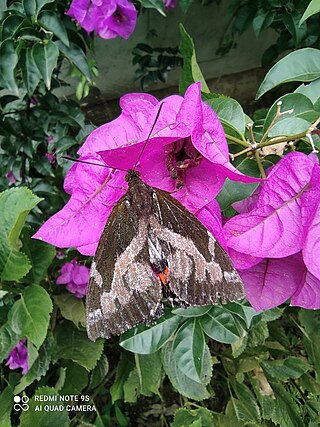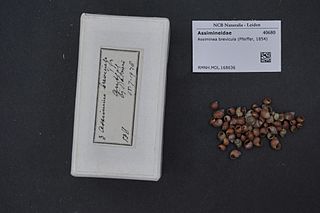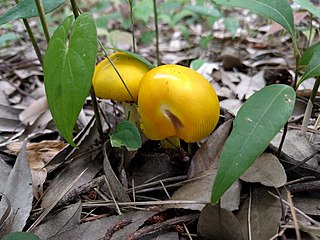
The spider family Liphistiidae, recognized by Tamerlan Thorell in 1869, comprises 8 genera and about 100 species of medium-sized spiders from Southeast Asia, China, and Japan. They are among the most basal living spiders, belonging to the suborder Mesothelae. In Japan, the Kimura spider is well known.

Castniidae, or castniid moths, is a small family of moths with fewer than 200 species: The majority are Neotropical with some in Australia and a few in south-east Asia. These are medium-sized to very large moths, usually with drab, cryptically marked forewings and brightly coloured hindwings. They have clubbed antennae and are day flying, and are often mistaken for butterflies. Indeed, some previous classification systems placed this family within the butterflies or skippers. The Neotropical species are commonly known as giant butterfly-moths, the Australian and Asian species as sun moths. The larvae are internal feeders, often on roots of epiphytes or on monocotyledons.

The Fukuda Doctrine is a Japanese foreign policy doctrine, based on a 1977 speech by Japanese Prime Minister Takeo Fukuda, stating that Japan would never become a military power. On the contrary, the policy proposes to enhance relations with Southeast Asian countries in wide-ranging fields, as well as to increase cooperation with the Association of Southeast Asian Nations (ASEAN) and its member countries. The Fukuda Doctrine serves as the foundation of Japanese diplomacy toward the rest of Asia.

Tascina is a genus of moths within the Castniidae family. It is found in South East Asia.

Papilio bianor, also known as the common peacock, Chinese peacock black swallowtail emerald or Chinese peacock, is a species of butterfly in the family Papilionidae, the swallowtails. It is native to Asia. It is the state butterfly of the Indian state of Uttarakhand.

Lyssa zampa, the tropical swallowtail moth or Laos brown butterfly, is a moth of the family Uraniidae. The species was first described by British entomologist Arthur Gardiner Butler in 1869.

Turbo cornutus, common name the horned turban, is a species of sea snail, marine gastropod mollusk in the family Turbinidae.
Eupalamides guyanensis is a moth in the Castniidae family. It is widely distributed in northern South America, from Venezuela to Guyana, Colombia and Brazil (Pará).
Castnia invaria is a moth in the family Castniidae. It is found in South America.
Dominickus is an extinct genus of moth in the butterfly-moth family Castniidae containing a single species Dominickus castnioides. The species is known from late Eocene, Priabonian stage, lake deposits near the small community of Guffey in Teller County, Colorado, United States.

Imara pallasia is a moth in the Castniidae family. It is found in south-eastern Brazil. It is found along cloud forests.

Imara satrapes is a moth in the Castniidae family. It is found in Brazil, Paraguay and Uruguay.

Geyeria decussata is a moth in the Castniidae family.
Tascina metallica is a moth in the Castniidae family. It is found on Borneo and Palawan.
Mirocastnia smalli is a moth in the Castniidae family. It is found in Panama. The habitat consists of a forest with Colpothrinax cookii palms, several moss covered trees and Bromeliaceae species.
Haemonides cronis is a moth in the Castniidae family. It is found in Mexico, Trinidad, Suriname, French Guiana, Brazil and Peru.
Lapaeumides zerynthia is a moth in the Castniidae family. It is found in Brazil, in the Neotropical realm. This species is likely found in lowland tropical forests, but future research is needed to confirm this.

Optediceros breviculum, common name the red mangrove snail, is a species of minute operculate snail, a freshwater or marine gastropod mollusk or micromollusk in the family Assimineidae.
The 2017 EAFF E-1 Football Championship will be the 6th edition of the women's tournament in EAFF E-1 Football Championship, the women's football championship of East Asia. It was held in Japan in 2017.

Amanita kitamagotake or Becker's ringless amanita is a species of Amanita from Japan.











